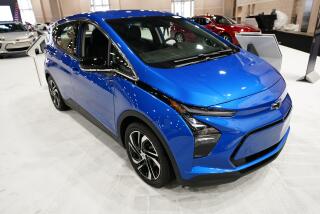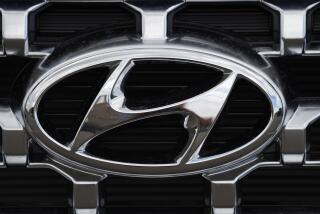Complaints About Japanese Autos Rise, Survey Says
DETROIT â The perceived âquality gapâ between Japanese and domestic cars appears to be narrowing, a new survey indicates.
An annual survey of new car owners and the problems they encounter shows that complaints about Japanese cars have increased in the last year, while problems with cars made by U.S. auto makers remained about the same.
Even so, the Japanese still do better than the domestics by a comfortable margin in the problems reported by more than 30,000 owners of new 1988 cars. The survey was done by J. D. Power & Associates, an independent market research firm based in Agoura Hills.
And reports of quality defects continue to nag even the most successful new domestic models, such as the hot-selling Ford Taurus. Consumer Reports magazine said in its June issue that its surveys found that owners of the Taurus and its twin, the Mercury Sable, were experiencing âgreater than averageâ repair problems.
A year ago, the survey showed that new cars owners reported 27% fewer quality problems with Japanese cars than with cars made by U.S. auto makers. This year that number shrank to 18%, according to the J. D. Power firm. Quality problems reported with European models exceeded both Japanese and domestic models.
Some analysts believe that the findings have stunned the Japanese auto makers.
âI think the results have surprised a lot of people,â said William Pochiluk, an industry analyst at Autofacts, a Paoli, Pa., market research firm.
Officials at the Japanese auto makers stressed that they believe the gap has narrowed only because the domestics are improving--not because the imports are getting any worse.
Reported Problems Rise
âAll we can say is that the domestics are doing a better job than they did in the past. I think that is obvious,â said Jim Olson, now a spokesman for Toyota who was previously a spokesman for Chevrolet. âI think there is no doubt that Japanese quality is still better. Toyota quality has not gotten worse, itâs just that the water level is rising.â
The survey âshows that Americans can produce quality products given the right incentives and management control,â added Marty Schwager, Nissanâs manager for customer satisfaction research. A spokesman for Honda said company officials were unavailable Monday to comment on the survey.
The survey found that, for every 100 owners of Japanese cars surveyed, there were 144 problems reported, compared to 129 problems per 100 surveyed in 1987. Included are owners of both cars imported directly from Japan and those built in the United States by Japanese auto companies.
In contrast, there were 176 problems reported per 100 domestic car owners, down from 177 problems in 1987.
In addition, the survey found that, overall, European cars received the most complaints from owners. Although several individual European car lines were rated very high in terms of quality, the entire European industry still lagged far behind both the Big Three and the Japanese, with 259 problems reported per 100 owners, compared to 190 last year.
Owners of 156 different model lines were surveyed by J. D. Power and were asked about 89 potential problem areas with their 1988 cars. The 12 major categories in the survey ranged from electrical systems to water leaks.
No Decline in Quality
One problem facing the Japanese and the Europeans in such a survey, J. D. Power officials believe, is that sharply rising prices on imported cars have led to rising expectations from import customers. Since the survey was limited to customers who had purchased their cars within the past 90 days, sticker shock could still be fresh in the ownersâ minds.
âCertainly, when you pay more, you will expect more,â said Bruce Johnson, an analyst with J. D. Power.
In fact, there is little evidence to suggest any decline in overall Japanese quality. In a separate breakout of the 20 most trouble-free cars as reported by owners in the survey, five of the top 10 cars were from Japan; the highest-ranked car in the survey was the Toyota Cressida. Only one of the top 10 was built in the United States, and that car, the Chevy Nova, is produced in a joint venture between Toyota and General Motors.
Analysts note that quality standards in the auto industry have been moving targets in the 1980s. If anything, consumer perceptions of Japanese quality may now be suffering only because Detroit is starting to catch up.
âOur surveys (of new car owners) show the Japanese are holding their own on quality, but they also show the Americans getting better,â said Bob Knoll, head of the auto test division of Consumers Union, the nonprofit consumer testing organization that publishes Consumer Reports. âThe average car is getting better.â
Surprisingly, the domestic makes that showed the biggest improvement in the J. D. Power survey came from General Motors, which has suffered serious image and sales problems over the past two years. In a ranking of the most trouble-free nameplates, as reported by owners surveyed, three GM passenger car divisions--Cadillac, Buick and Oldsmobile--were the only domestic makes in the top 10.
Those rankings were based on the average number of problems reported for all models of cars sold under each nameplate. Ironically, while the Europeans did poorly overall in the survey, Porsche topped the separate nameplate rankings, while Mercedes-Benz came in second. However, they were the only two European makes in the top 10. The survey did not list the worst cars or nameplates.






